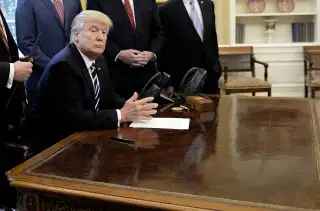How Donald Trump Is Helping and Hurting Obamacare at the Same Time

While the Trump administration pursues plans to repeal and replace Obamacare, it is making some seemingly conflicting moves aimed at the current system.
One federal agency has proposed changes to shore up the Obamacare health-insurance marketplaces, while a separate decision by the Internal Revenue Service weakens an incentive for consumers to enroll in coverage.
The clashing positions have raised concerns from some who study the health insurance market. “It’s a bit disingenuous to put out proposals from one agency to stabilize the market while sending signals through another that take away a major incentive for people to sign up," said Sabrina Corlette, a research professor at Georgetown University’s Center on Health Insurance Reforms.
How Trump Is Helping Obamacare
Rules proposed Wednesday by the Department of Health and Human Services would make it harder for consumers to game the system by signing up for health insurance only when they need it. Insurers had lobbied for some of the proposed changes during the Obama administration, says Karen Pollitz, senior fellow at the Kaiser Family Foundation.
If the proposals are adopted, more carriers may stick around amid the current uncertainty. Insurers’ contracts are set for 2017, and carriers are currently evaluating whether to continue their participation in the marketplaces for 2018 and beyond.
Many Republicans don’t want insurers to bail out of the exchanges before they can come up with a replacement plan for Obamacare, formally known as the Affordable Care Act. It's unclear when a replacement plan will be ready. Earlier this month, Trump appeared to walk back campaign promises to quickly repeal and replace the law, saying that a replacement might not be ready until next year -- although at a press conference on Thursday, the president shifted gears again, saying a plan would be available by mid-March.
The changes proposed Wednesday include stricter documentation requirements for the special enrollment periods that allow eligible consumers to enroll in coverage outside the annual open enrollment period. The proposed regulations would require pre-enrollment verification of eligibility for a special enrollment period. Today, people can self-attest to their eligibility and obtain coverage at their next eligible date. While some today might be asked to provide documentation in one of the periodic spot checks the marketplaces conduct, it isn't required to start coverage.
Another proposed change would shorten the annual open enrollment period starting in 2018, narrowing it from the currently scheduled Nov. 1, 2017 through Jan. 31, 2018 to Nov. 1, 2017 through Dec. 15, 2017. This would reduce the opportunity for people who find out they need medical services late in the year to sign up for coverage, the proposal says.
Corlette, of Georgetown, questions the ultimate motivation of the proposed regulations. While the stated goal is to stabilize the insurance markets, in practice many of the proposals could make it more onerous for consumers to enroll, causing those who don’t think they need the coverage—in other words, the very young, healthy people whom insurers most covet—to give up.
Humana on Tuesday announced that it would exit the marketplaces for 2018. Humana was a relatively small player, participating in 11 state exchanges. Still, if too many other carriers follow suit, the marketplaces could effectively disappear and people would lose coverage. This would create a political nightmare for Republicans who have promised they will not rip the rug out from the 22 million consumers with Obamacare coverage.
How Trump is Hurting Obamacare
Meanwhile, the IRS has said it won't make taxpayers disclose their health insurance status, reversing plans to begin rejecting tax returns that failed to indicate whether the consumer had coverage or qualified for an exemption, the San Francisco Chronicle first reported. "This was another tweak that would have encouraged more Americans to enroll in health insurance," says Sara R. Collins, vice president, health care coverage and access at the Commonwealth Fund, over email. "So by not implementing the change, we will not see the improvement in nationwide coverage that we might have seen otherwise."
The IRS changed course following President Donald Trump’s executive order in January intended to minimize the “fiscal burden” of Obamacare. In a statement for tax professionals on its website, the IRS said it “will continue to allow electronic and paper returns to be accepted for processing in instances where a taxpayer doesn’t indicate their coverage status.”
This doesn’t eliminate the penalty that the uninsured must pay. The executive order didn’t undo that, and people who don’t qualify for an exemption still owe $695 per adult or 2.5% of household income, whichever is higher, for going without coverage for 2016 or 2017.
Nonetheless, the IRS action creates “a public perception issue,” Georgetown's Corlette says. If people mistakenly think they won't be on the hook for the penalty, they won’t have as much incentive to sign up for coverage. In a 2014 survey for Enroll America, as many as 40% of respondents said they might not have enrolled without the individual mandate requiring people to do so.
Trump has said Obamacare is a disaster, and his administration’s actions could create a self-fulfilling prophecy, Corlette says.
This story has been updated to reflect further comments by President Trump.